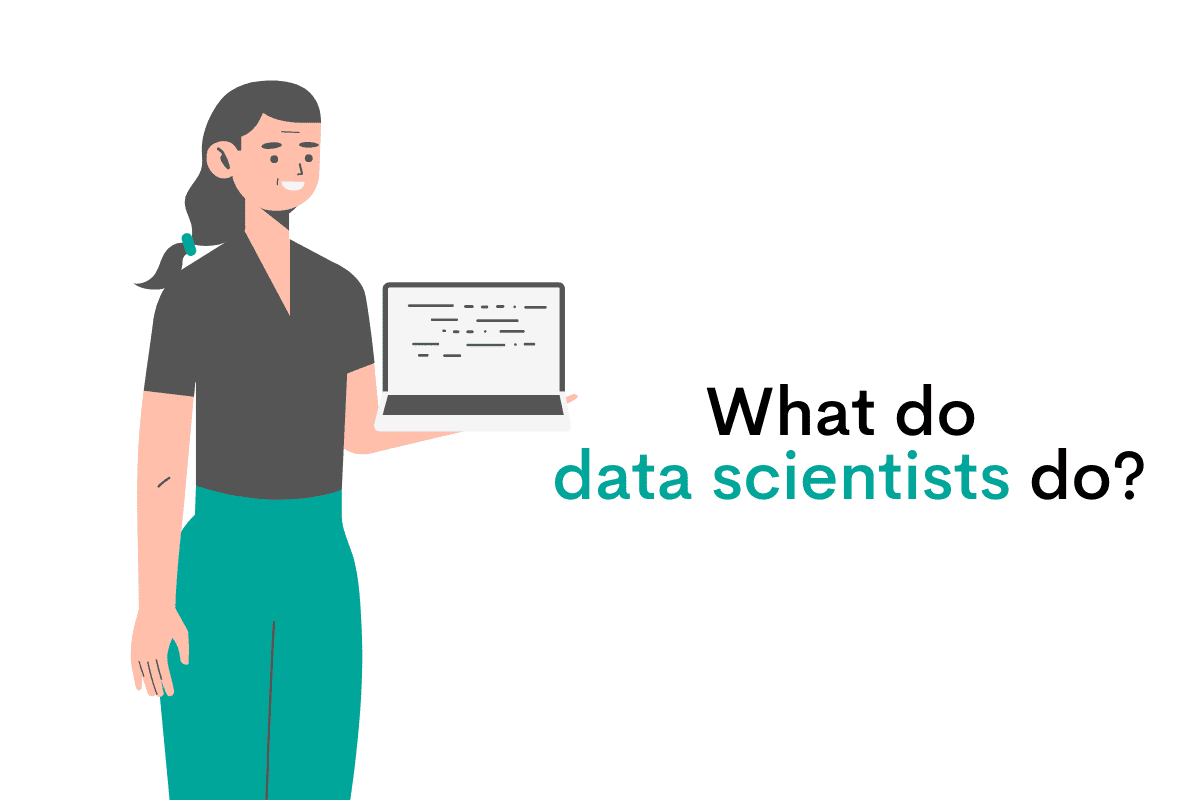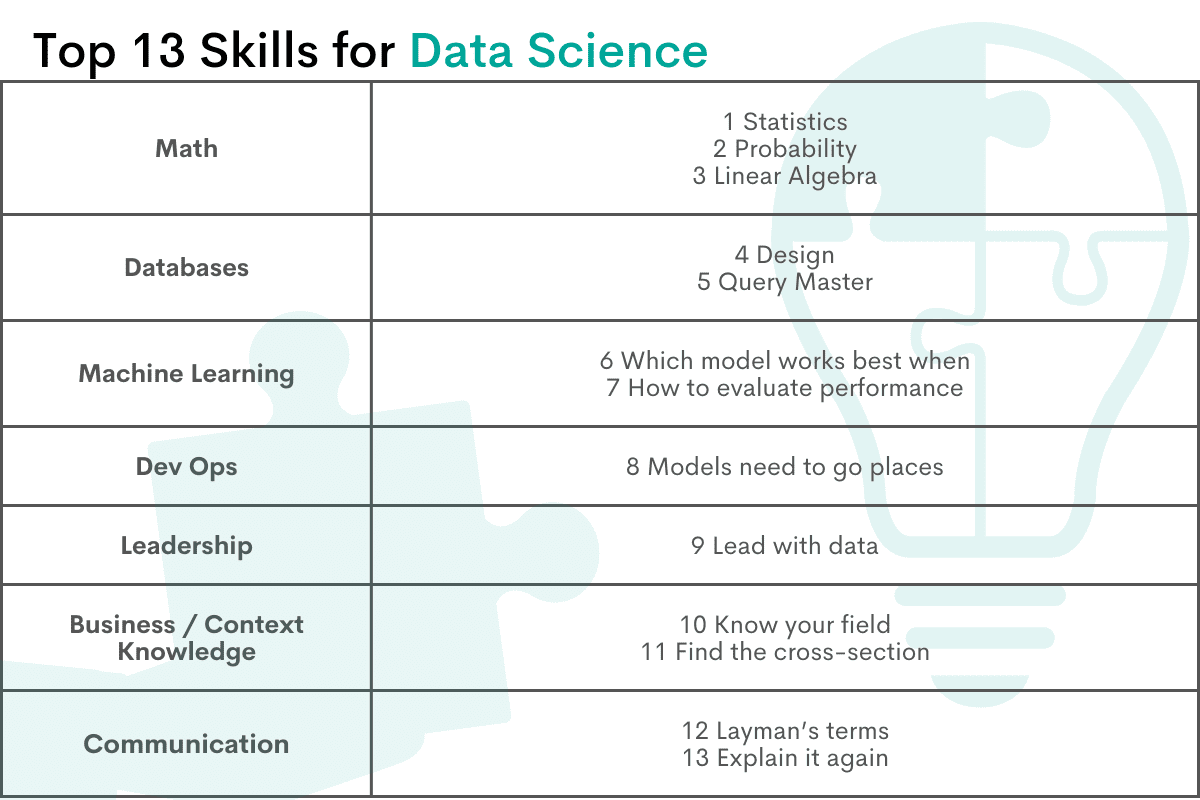
Top 13 Skills That Every Data Scientist Should Have
Let me walk you through the top 13 data science skills that you should have to become a successful data scientist. Following this outline, you’ll have a great path of digestible steps to educate yourself and be prepared to apply for data scientist positions.

Whether you’ve already squeezed your way into the data science world or you’re looking to do it, data science is one of the best industries to get into without a formal education in data science. If you can build up the skills and knowledge that the job requires without getting an official degree, most tech companies are happy for you to prove it in a technical interview and then hire you.
However, without having a formal degree in an area, it can be hard to know what you need to know. What data science skills will those technical interviews cover? What’s the best way to attain that knowledge or those capabilities?
Let me walk you through the top 13 data science skills that you should have to become a successful data scientist. Following this outline, you’ll have a great path of digestible steps to educate yourself and be prepared to apply for data scientist positions.
What is Data Science?
Every day, about 2.5 quintillion bytes of data are created and by 2025 175 zettabytes of data. This horde of information contains powerful insights that can help drive change across the world, from reducing carbon emissions to maximizing a company’s profits. Data science is about trying to make sense of the numbers and produce actionable insights that help the organization. A data scientist could analyze the results of an A/B experiment in order to optimize the user’s experience or could determine which ad campaigns or combinations increase sales of a product more.
What Do Data Scientists Do?

Data scientists are involved in the whole process from acquiring data to producing digestible reports for their non-tech colleagues. Data scientists occupy themselves with the entire data science life cycle. Data scientists build data pipelines, combining various data sources in order to collect the necessary information. Then, they clean the data to prepare it for analysis. Statistical analysis is used to extract aggregate information from the data.
Sometimes data scientists also build machine learning models, and when they do, they also have to evaluate, deploy, and maintain those machine learning models to expand their impact and relevance. Data scientists are also responsible for taking all of these learnings from the data and convey them to non-technical parties in the form of visualizations and action items. This delivery can be in the form of a visual, report, dashboard, or presentation.
To understand this deeper, we wrote an ultimate guide to working your way through data science → “What Does a Data Scientist Do?”.

Top 13 Skills for Data Science
Math
Math is the basic building block for all forms of data science. Whether you’re finding the median of a data set, developing machine learning models, or identifying whether the treatment of an A/B experiment had a significant impact on a metric, you’ll need to have a masterful grasp of statistics, probability, and linear algebra.
1. Statistics
Statistics is one of the must-have data scientist skills in order to analyze A/B experiments. You will need to answer questions like, how big does the sample size need to be to prove the results are significant? Mean, variance, and standard deviation, as well as concepts like a population and sample are critical parts of extracting significant meaning from data. You should be familiar with both descriptive and inferential statistics.
2. Probability
Probability is an important data scientist skill when it comes to analyzing data affected by chance. Probability theory allows for the analysis of chance events. Probability distributions of variables play a key role in predictive analytics.
3. Linear algebra
Linear algebra is the mathematical basis for machine learning and a lot of high-level matrix work. In order to effectively use any machine learning algorithm, it’s important that you understand the math behind them, specifically that of linear algebra, to understand what assumptions are made and what the shortcomings are.
Databases
Databases are the beautiful, elegant constructs that hold the air data scientists breathe. In the world of big data, databases are crucial to storing, updating, and manipulating large datasets. As a data scientist, you should be very comfortable with databases on both theoretical and practical levels.
4. Design
Data only works when it’s organized and clean. Though a data or solutions architect will probably be the one to actually design the database, you should know why a database is organized a certain way and the strategies behind how to design one. Know how to properly store data in a specific structure in order to build your model.
5. Query master
SQL, KQL, scope scripts, etc - you should be an artful master using any/all of the popular querying languages. Partner teams will need fast estimates from you in regards to which direction they should head in. Pulling out some clean, accurate aggregates in a pinch can go a long way in maximizing the productivity of those that depend on you, and it’s a great and convenient way to promote data-driven decisions within your organization.
Machine Learning
Although not all data science positions require you to be comfortable designing, developing, and evaluating machine learning models, it is certainly the direction the industry is heading towards. If you aren’t already proficient in machine learning models, I would spend the time to gain these skills, as they will go a long way in helping ensure your future job security and keeping your skillset relevant.
6. Which model works best when
Know which machine learning model will work best in which situation depending on whether the data you are working with is labeled, unlabeled, a binary dataset, or one with multiple groupings. If the data is words, numbers, images, etc can also how you adjust and select the models to maximize performance.
7. How to evaluate performance
In order to determine how well your model performs, you have to be able to properly evaluate it. Know the differences between testing and training data, strategies for separating your source data into the two, and when to use each set during the development and performance evaluation cycle.
Dev Ops
If you’re not developing machine learning models as a part of your data science work, then you don’t need to worry about deploying them. However, the highest potential for business impact is creating live predictive models. It’s a valuable investment to gain these skills, as it will significantly increase the impact of your work.
8. Models need to go places
For a data scientist who develops machine learning models, you need to share your models. If you can predict how likely a user is to respond to an ad, this knowledge is a lot more useful if the prediction can be made live and is accessible via an API call. Instead of just giving your company’s project managers an idea of which areas to develop next, you can tailor the product to maximize engagement, purchases, retention, etc for each end user. Providing live predictions allows you to integrate data science into the product.
Leadership
9. Lead with data
As you communicate your findings to other departments in the company, they may be trying to fit in what you’re saying to their own deadlines, priorities, etc. Make sure you take the time to understand their scenario and how your insights can help them maximize their business impact. Data-driven decisions are much more likely to deliver results, and it’s your job to help those around you understand that.
Business/Context Knowledge
10. Know your field
You need to know what the context of the data you’re working with is. If you’re looking at images of slides from CT scans or grocery store receipts, the numbers you pull out of those data sets and the different attributes for those datasets could mean very different things. You should aim to become an expert on the source of your data, as this contextual knowledge will help guide you down the right path for your analyses. This knowledge will also help you identify and challenge your assumptions, or at the very least account for them.
11. Find the cross-section
You need to figure out how your technical knowledge meets the business area you are working in. Once you are able to identify this cross-section, you can work to identify new sources of data and come up with insightful ways to augment your data.
Communication
12. Layman’s terms
Your numbers and scripts have to spit out words that guide the actions of whole teams, departments, and even the company. Knowing the business is just as important as knowing the technical things in order to communicate successfully with non-technical individuals. Your job as a data scientist is to extract the value of your organization’s data to improve the product, the company’s processes, and the lives of its employees. Find ways to communicate your findings so that those around you understand the significance and what to do about them.
13. Explain it again
Know when to emphasize and reiterate the things that matter. Repetition is an important tool when it comes to helping people understand complex concepts. Pair down all of these complicated, intricate results and models into the most important items that are under the control of the company. You may have spent a lot of effort normalizing your data set and controlling for myriad factors, but the part that matters is what these numbers and equations mean for the people trying to improve the product or service for the end user.
Final Thoughts on Important Skills for Data Scientists
Technical data science skills are the fundamental basis of a data scientist’s work. Mathematical analysis and coding are often thought of as the most important tasks for a data scientist, but being able to communicate the significance of these findings and what should be done to nudge the needle in the right direction is just as important. A data scientist’s ultimate responsibility is to make the data valuable to the company, and the only way to do that is to extract insights that can be made into contained, measurable action items that can be tracked with metrics. Be a champion of data-driven decisions and prove to your organization the value of driving the improvement of the product, internal processes, and practically anything through data science.
We also recommend checking out our ultimate guide to data scientist skills to know what makes you keep your job and advance as a data scientist.
Nate Rosidi is a data scientist and in product strategy. He's also an adjunct professor teaching analytics, and is the founder of StrataScratch, a platform helping data scientists prepare for their interviews with real interview questions from top companies. Connect with him on Twitter: StrataScratch or LinkedIn.
